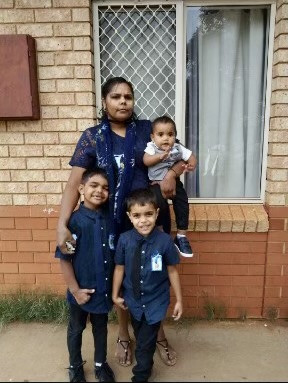It’s National Reconciliation Week (27 May-3 June) and during this week we are encouraged to take the opportunity to learn about our shared histories, cultures, and achievements, and to explore how each of us can contribute to achieving reconciliation.
Reconciliation Australia CEO, Karen Mundine says this year’s theme, Be a Voice for Generations, calls on Australians to honour the work of generations past who fought for justice in Australia and to work together today to tackle the unfinished business of reconciliation for the generations to come.
This year’s theme urges us all to use our power, words and our vote to create a better, more just Australia for all. I have been reflecting on how I could do this in practical terms, asking myself if my actions match my desire for a more reconciled country where Indigenous Australians experience none of the disadvantage and racism that they do today. I still have some work to do – I think we all do if we really want to achieve this.
This blog gives me an opportunity to Be a Voice. This month, instead of being a voice, I want to amplify others’ voices. Below are some insights from Jane, a Nyunga woman, and her gorgeous boys.
Jane:

I am a Nyunga woman living on Noongar boodja. Nyunga Country is in South Australia, near Ceduna. During the pandemic my family was stuck inside all the time. It was impacting my mental health and my family’s. I did a Mental Health Certificate before the pandemic and I realised I needed to get out in nature more. We started by taking our three kids to the river near our house just to get out. I needed a peaceful place to go, to get my kids using up their energy.
The kids started asking to go bush and were asking more questions about where they come from. My mum is a Nyunga woman but I grew up in in Goomalling (Ballardong Country), then Kalgoorlie. My Aunty took me back to my Mother’s Country a while ago to visit and connect to my Country there. The boys’ Pop (Dad’s dad) is from Quairading. Their Grandma (Dad’s mum) was from Perenjori which is beautiful wildflower Country. The boys are connected to Country all over WA and SA through their family.
We started going out to Country in Kalgoorlie, to the red dirt, to Goomalling, to Quairading and York. Seeing the places they come from, learning about the animals, the kangaroo, the emu, the snake, is good for them. Learning how our stories are told through dance. Knowing their Country makes them strong.
I ask my kids where they want to go and they answer, they want to go bush, out into nature, on Country. It is important for families to get outside, to learn about the land and the Country they live on. It is important for them to learn from their Elders, passing on their knowledge to the next generation on Country. We need to take them out so they know who they are. I would love to take them bush and set up a camp on Country with them but I haven’t got the equipment. I want them to feel proud of their culture, their Country and their background. One of my biggest dreams is to go to Broome and Darwin to see Stairway to the Moon and salt water crocodiles.
What do you love about being outside?
Dhurrell: My mum finds workshops and places to go in the city and out bush. I just went to a holiday program and I learnt about joeys, bobtails, snakes and tawny frogmouths. We went running in the bush. I asked my mum if we’d see those animals in the bush when we went on Country. I want to be back in the bush now to see if we can see them.
If you could go anywhere, where would you go?
Duhrell: I told my Mum I want to go camping. I’d go camping out bush with my family in Kalgoorlie. My mum wants to get camping gear and a cooking pot.
What is something that you wish adults knew about kids?
DuhrelI: My Mum and Dad take me on Country. I want adults to know my Country and culture is important to me. It would be good to learn about the bush and learn Noongar and other Aboriginal languages at school.
What could adults do to make kids’ lives better?
Duhrell: Get your kids outside more.
Jane: It is all about being on Country, healing and sharing stories. Listen to your kids. They need this on-Country time.
Learning about Jane’s family and their connection to Country has been a privilege. I hope that this reconciliation week brings a similar opportunity for others and inspires us all to continue to work on the unfinished business of reconciliation.
